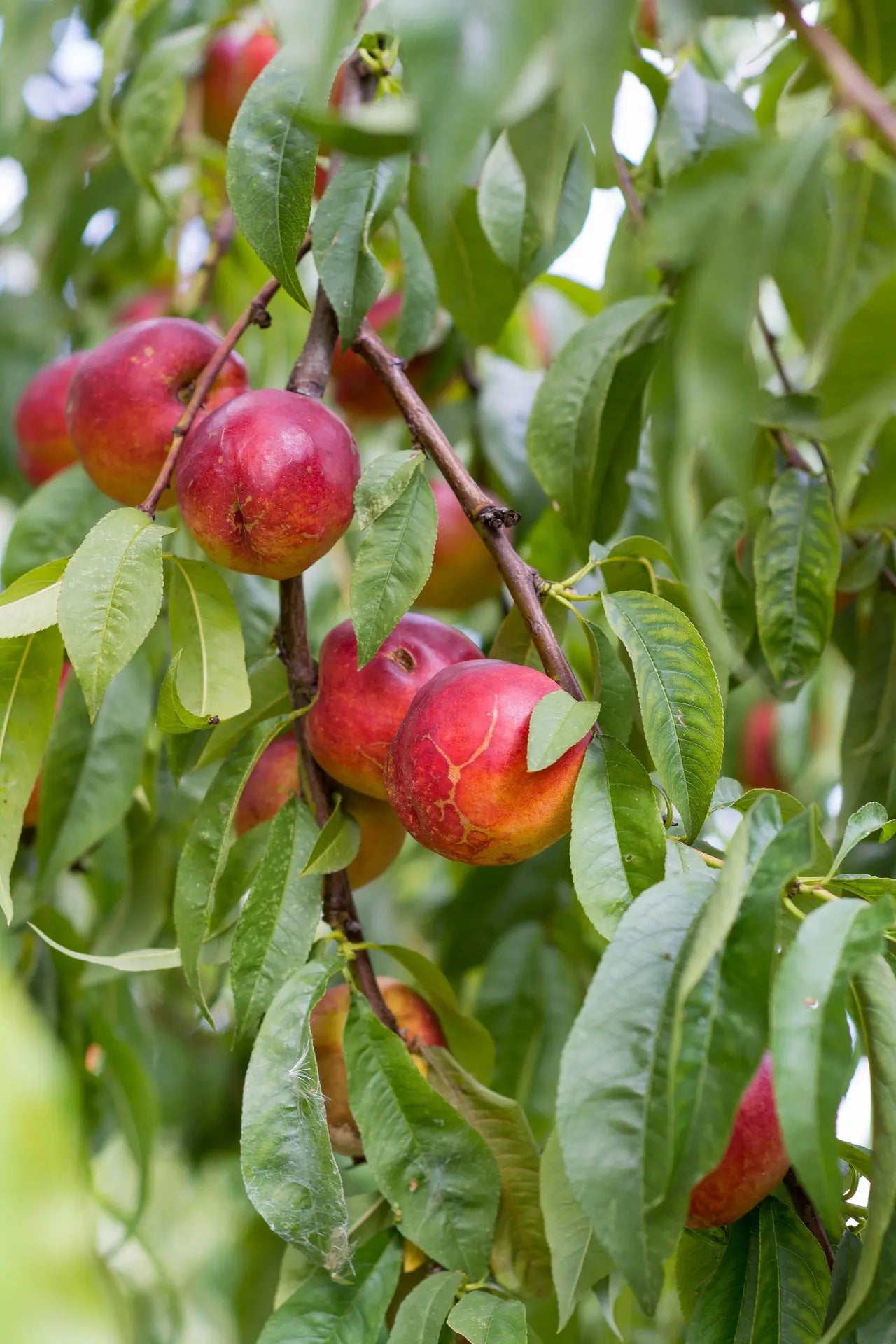-
Delivery from 10 plants to France, Switzerland and Europe
Delivery method -
Fruit Tree Wholesale Supplier
About Us -
Quality Fruit Tree Plants
Technical itinerary
Honey Queen® Yellow Flesh Nectarine Tree grafted on GF677 and Mirab.29-C bare-root 100-120 cm
Honey Queen® Yellow Flesh Nectarine Tree grafted on GF677 and Mirab.29-C bare-root 100-120 cm
The prices shown are our base prices for large volumes. Depending on the quantity ordered and the producers’ pricing scales, the rate may be adjusted upward. Each quote is personalized to ensure you receive a fair price.
Mini order 50 units / Multiple orders 10 units (FRSHER202503001)
Couldn't load pickup availability
 Buy now and get it delivered when you're ready to plant - Add your desired date to your quote request
Buy now and get it delivered when you're ready to plant - Add your desired date to your quote request
- Delivery from 10 plants to France, Switzerland and Europe

Honey Queen® Yellow Flesh Nectarine Variety Fact Sheet
- Fruit flesh color: Yellow
- Average fruit size: 2A/A (large size)
- Fruit shape: Round
- Fruit maturity: Generally late July or early August
- Fruit taste: Excellent taste quality, sweet, honey-like flavor
- Earliness of the variety: Seasonal
- Fruiting period Late July to early August
- Disease resistance and storage: Known for its good resistance to peach leaf curl. Storage is not specified.
- Variety yield: Productive, considered an interesting alternative to Honey Royale for its productivity and consistency.
- Is this variety self-fertile? Yes.
- Commercial use: Productive variety producing large fruits of very good taste. Suitable for southern areas.
- Comments: Interesting alternative to Honey Royale for its productivity and regularity. Requires few hours of cold, rather suited to southern areas. Upright habit and good vigor.
Quick read / the essentials on Honey Queen® nectarine
Honey Queen® is a yellow-fleshed nectarine variety from California, resulting from the prestigious Zaiger Genetics breeding program. It has strong similarities with Honey Kist® , notably in its high eating quality, its large size (2A/A), and its beautiful, attractive dark red skin. The fruit, round and regular, develops a sweet, firm and juicy flesh, with a very aromatic and slightly acidic taste, particularly appreciated on the fresh market. It ripens between the end of July and the beginning of August, at the same time as Honey Royale, which allows it to cover a strategic commercial window.
At Arboriverse , a specialist wholesale supplier of nectarine plants , we recommend Honey Queen® for its consistent production, good post-harvest performance and natural adaptation to southern French conditions. Its vigorous, upright tree is easy to train and requires initial staking to optimise its structure. The variety is self-fertile and well-adapted to well-drained, low-calcareous soils, thanks to proven rootstocks such as GF 677, Cadaman or Montclar.
Buying Honey Queen® nectarine plants from Arboriverse means accessing a high-quality variety from a premium range and benefiting from the support of a recognized wholesale supplier specializing in nectarine plants . Whether for planting in a traditional orchard or in an intensive system, buying Honey Queen® nectarine plants represents an informed choice for producers wishing to combine aesthetics, flavor and productivity.
Origin and status of the variety
The Honey Queen® nectarine tree is a yellow-fleshed variety developed in California (USA) . It is possibly synonymous with the Honey Kist® variety , according to several sources, which broadens the available information base. This variety is part of the famous Honey series developed by Zaiger Genetics , known for its sweet fruit and taste quality. Although the VOC protection status is not specified for Honey Queen®, it is recommended to check the marketing conditions before any large-scale production.
Fruit characteristics
Honey Queen® fruits are large , classified 2A/A , with an average weight estimated between 160 and 180 g . Their shape is round and regular , and their commercial presentation is remarkable , with a very attractive dark red skin , close to that of Honey Kist®.
The yellow flesh is firm, juicy, sweet and mild , with excellent taste quality . The fruit develops low acidity and a very aromatic taste , sometimes compared to a hint of honey, making it a product highly appreciated by the consumer.
No precise data is available on the shelf life , but the good firmness of the fruits suggests satisfactory shelf life after harvest, including for transport or short-term storage.
Maturity period and harvest
The variety ripens at the same time as Honey Royale , which places the harvest in France between the end of July and the beginning of August , depending on regional conditions. It is therefore positioned at the height of the season in the calendar of yellow-fleshed varieties. This commercial niche is strategic, as it corresponds to a strong demand on the fresh markets.
Tree and vegetative behavior
The Honey Queen® rootstock produces a vigorous , upright tree. At full maturity, the tree generally reaches a height of 3 to 4 meters , with an equivalent width. The growth is regular and well-balanced.
Staking is recommended during the first few years, particularly to ensure good structural support and to support growth in windy areas or areas with heavy fruit production.
The variety is described as very productive and consistent , making it a reliable choice for commercial operation.
Fertility and pollination
Honey Queen® is self-fertile , making it much easier to grow. No other pollinating variety is required for optimal production. However, as is often the case with nectarines, the presence of other trees nearby can enhance cross-pollination and slightly improve yield.
Resistance to diseases and parasites
Specific information on Honey Queen® is limited, but the closely related Honey Kist® variety is known for its good resistance to peach leaf curl (Taphrina deformans) . This would make it a good candidate for low-input orchard or organic farming .
No specific data is mentioned for pest resistance . Like most nectarines, the variety can be exposed to attacks by aphids, scale insects or fruit flies , requiring regular phytosanitary monitoring.
Tolerance to soil and climate conditions
There is no specific information on tolerance to lime or root asphyxiation . These will depend largely on the rootstock chosen . Nectarine trees generally prefer well-drained, slightly acidic to neutral soils .
No clear indication of drought resistance has been found, but established trees generally have medium tolerance , provided they receive regular watering during critical periods (especially fruit formation).
Rootstocks compatible for cultivation in France
The Honey Queen® variety is compatible with the main rootstocks used in France for nectarine trees:
-
GF 677 : vigorous, suitable for calcareous and dry soils.
-
Montclar : medium vigor, good adaptation to fertile soils .
-
Cadaman : very vigorous, recommended for replanting and wet soils .
-
Rubira : good compatibility, interesting for rapid fruiting , resistant to bacterial blight.
The choice of rootstock must be adapted to the soil and the agronomic objectives of the orchard.
Performance and economic potential
No figures are available for Honey Queen® itself, but it is described as very productive and consistent , like Honey Kist®. A yield per tree of between 25 and 60 kg can therefore reasonably be expected depending on training, climate and soil.
The commercial positioning of Honey Queen® is clearly focused on fresh consumption , with an attractive, tasty and well-calibrated fruit. It is suitable for short circuits, direct sales as well as large-scale distribution thanks to its good presentation and consistency.
Conclusion
The yellow-fleshed nectarine tree Honey Queen® is a serious alternative to Honey Royale , both in terms of size , taste quality and precocity . Its high productivity , self-fertility and probable resistance to leaf curl (via its proximity to Honey Kist®) make it a very interesting variety for professional producers looking for reliability, particularly in southern France.
For optimal exploitation, it will be necessary to validate with the publishers the availability of the variety and the conditions of its commercial use in France. A comparative analysis with Honey Royale and other mid-season varieties would allow to better identify its strategic interest in a staggered production calendar .
To summarize: Honey Queen® nectarine tree
Honey Queen® is a mid-season variety of nectarine with yellow flesh, developed to meet the requirements of the fresh market: size 2A/A , shiny dark red skin , sweet and firm flesh , and mild aromatic taste . Its harvest period, between late July and early August, coincides with peak summer demand. In the orchard, the tree is vigorous, upright, easy to train, and shows very good regularity of production . Its self-fertility simplifies the organization of the orchard and optimizes natural pollination.
Arboriverse , a specialist wholesale supplier of nectarine plants , offers Honey Queen® to professionals wishing to diversify their harvest schedule with a reliable, high-quality variety well-adapted to the conditions of the South of France. Thanks to a wide choice of rootstocks (GF 677 for dry soils, Cadaman for heavy soils, Rubira for rapid fruit set), the variety can be effectively established in different pedoclimatic contexts. Its commercial positioning is ideal for short circuits, direct sales or distribution brands looking for premium fruits.
Buying Honey Queen® nectarine plants from a specialist nectarine plant wholesaler like Arboriverse means choosing a fruit with high added value, a variety known for its taste quality and tailored technical support. Buying Honey Queen® nectarine plants means anticipating consumer expectations with a reliable, tasty and commercially successful solution.
-
Honey Queen® Yellow Flesh Nectarine Tree grafted on Garnem bare-root 100-120 cm
Regular price €5,95 EURRegular priceUnit price / per -
Honey Queen® Yellow Flesh Nectarine Tree grafted on RP-40 bare-root 100-120 cm
Regular price €6,55 EURRegular priceUnit price / per -
Honey Queen® Yellow Flesh Nectarine Tree grafted on PR-R/Mirared bare-root 100-120 cm
Regular price €6,15 EURRegular priceUnit price / per -
Honey Queen® Yellow Flesh Nectarine Tree grafted on GF677 and Mirab.29-C bare-root 100-120 cm
Regular price €5,75 EURRegular priceUnit price / per -
Honey Queen® Yellow Flesh Nectarine Tree grafted on Garnem 1L pot
Regular price €6,25 EURRegular priceUnit price / per -
Honey Queen® Yellow Flesh Nectarine Tree grafted on RP-40 1L pot
Regular price €6,85 EURRegular priceUnit price / per



